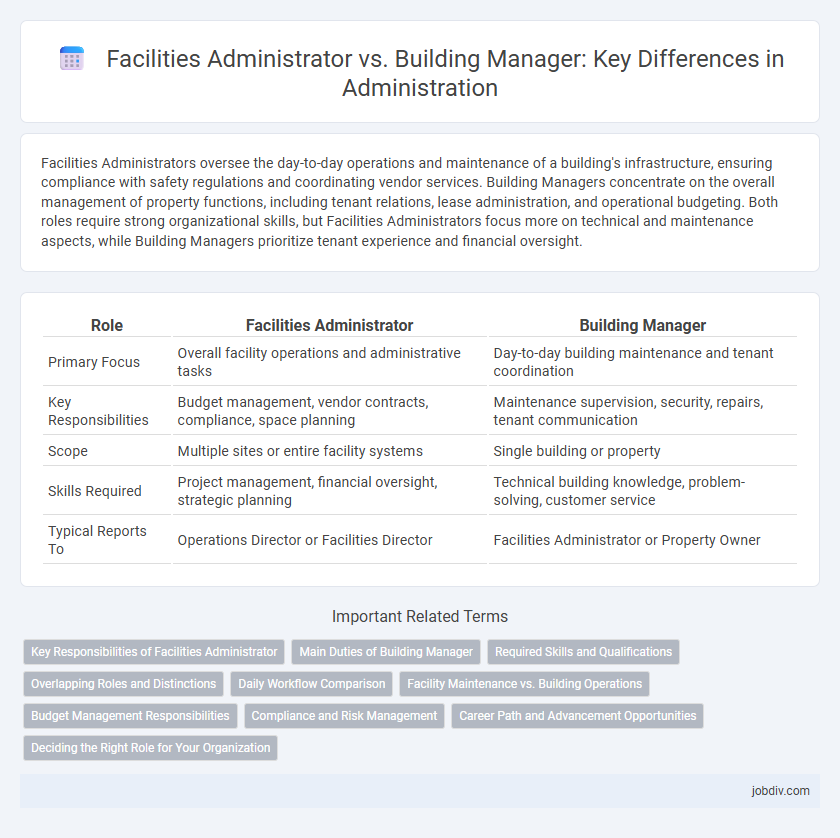Facilities Administrators oversee the day-to-day operations and maintenance of a building's infrastructure, ensuring compliance with safety regulations and coordinating vendor services. Building Managers concentrate on the overall management of property functions, including tenant relations, lease administration, and operational budgeting. Both roles require strong organizational skills, but Facilities Administrators focus more on technical and maintenance aspects, while Building Managers prioritize tenant experience and financial oversight.
Table of Comparison
| Role | Facilities Administrator | Building Manager |
|---|---|---|
| Primary Focus | Overall facility operations and administrative tasks | Day-to-day building maintenance and tenant coordination |
| Key Responsibilities | Budget management, vendor contracts, compliance, space planning | Maintenance supervision, security, repairs, tenant communication |
| Scope | Multiple sites or entire facility systems | Single building or property |
| Skills Required | Project management, financial oversight, strategic planning | Technical building knowledge, problem-solving, customer service |
| Typical Reports To | Operations Director or Facilities Director | Facilities Administrator or Property Owner |
Key Responsibilities of Facilities Administrator
A Facilities Administrator oversees the coordination and maintenance of building infrastructure, ensuring compliance with safety regulations and managing vendor contracts for repairs and services. They handle budgeting, space allocation, and procurement of office supplies to support daily operations. Facilities Administrators also monitor facility performance metrics to optimize efficiency and reduce operational costs.
Main Duties of Building Manager
Building Managers oversee the day-to-day operations and maintenance of commercial or residential properties, ensuring safety compliance, managing vendor contracts, and coordinating repairs. They supervise facility staff, conduct regular inspections, and handle tenant relations to maintain optimal building performance. Their role includes budgeting for maintenance projects and implementing emergency protocols to protect assets and occupants.
Required Skills and Qualifications
Facilities Administrators require strong organizational skills, proficiency in budget management, and knowledge of compliance regulations to ensure smooth operational workflows. Building Managers need expertise in maintenance protocols, tenant relations, and safety standards to effectively oversee building functionality and occupant satisfaction. Both roles demand excellent communication abilities and problem-solving skills to coordinate teams and manage facility or building challenges efficiently.
Overlapping Roles and Distinctions
Facilities Administrators and Building Managers both oversee the maintenance and operational functions of commercial or residential properties, ensuring safety, compliance, and efficiency. Facilities Administrators typically focus on coordinating vendor services, managing budgets, and overseeing facility-related administrative tasks, while Building Managers often handle daily on-site operations, tenant relations, and immediate problem resolution. The overlap occurs in areas like maintenance scheduling and safety inspections, but the distinction lies in Facilities Administrators' broader strategic planning versus Building Managers' hands-on, day-to-day property management.
Daily Workflow Comparison
Facilities Administrators oversee maintenance scheduling, vendor coordination, and compliance documentation to ensure seamless building operations. Building Managers focus on hands-on daily inspections, tenant relations, and immediate issue resolution within the physical premises. Both roles require strong organizational skills but differ in emphasis: strategic planning for Facilities Administrators versus operational execution for Building Managers.
Facility Maintenance vs. Building Operations
Facilities Administrators primarily oversee facility maintenance, ensuring all equipment, HVAC systems, and infrastructure are regularly inspected and repaired to prevent disruptions. Building Managers focus on building operations, managing day-to-day activities such as security, tenant services, and compliance with safety regulations. The distinction lies in Facilities Administrators maintaining physical assets while Building Managers coordinate operational functions to support occupant needs.
Budget Management Responsibilities
Facilities Administrators primarily oversee budget planning, cost allocation, and financial reporting to ensure operational efficiency within organizational facilities. Building Managers focus on managing day-to-day expenses, vendor payments, and maintenance costs to align with the approved budget constraints. Both roles require strong budget tracking and financial analysis skills but differ in the scope of budget control and strategic financial decision-making.
Compliance and Risk Management
Facilities Administrators oversee compliance by ensuring all building operations meet regulatory standards, manage documentation for audits, and implement risk mitigation strategies to prevent safety violations. Building Managers focus on day-to-day risk management by conducting regular inspections, coordinating maintenance to address hazards, and ensuring tenant adherence to safety protocols. Both roles are crucial in maintaining legal compliance and minimizing liabilities within facility operations.
Career Path and Advancement Opportunities
Facilities Administrators typically advance by gaining expertise in facility management software, compliance regulations, and project coordination, leading to roles such as Facilities Manager or Operations Director. Building Managers often progress through hands-on experience with property maintenance, tenant relations, and vendor management, opening paths toward Senior Building Manager or Property Management Executive positions. Both career paths emphasize leadership development, with opportunities expanding by obtaining certifications like Certified Facility Manager (CFM) or Real Property Administrator (RPA).
Deciding the Right Role for Your Organization
Choosing between a Facilities Administrator and a Building Manager depends on the scope and complexity of your organization's property needs. Facilities Administrators focus on operational efficiency, space planning, and vendor coordination, making them ideal for organizations seeking comprehensive management of multiple facilities. Building Managers are typically responsible for the day-to-day maintenance, security, and tenant relations within a single property, suitable for organizations prioritizing hands-on oversight and building-specific issues.
Facilities Administrator vs Building Manager Infographic

 jobdiv.com
jobdiv.com